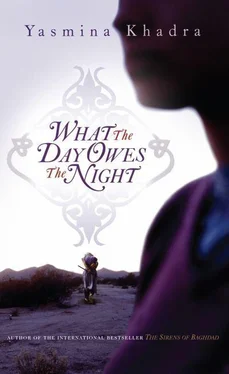‘Can you see my husband?’ Hadda asked anxiously. ‘Where is he? What is he doing? Has he taken another wife? Is he dead? I’m begging you, Batoul, tell me. I need to know the truth, no matter what it is.’
Batoul sighed, her shoulders slumped.
‘I do not see your husband, my poor Hadda. Nowhere. I sense no presence, not the least trace of him. Either he has gone far away, so far that he has forgotten you, or he is no longer of this world. One thing is certain, he will not return.’
Hadda swallowed hard, but she carried on, her eyes boring into the psychic’s face. ‘Tell, me, Batoul, what does my future hold? What will become of me? I am a single woman with two small children, I have no family, no husband . . .’
‘We will not abandon you,’ Badra promised.
‘If my husband has abandoned me, there are no shoulders broad enough to hold me up,’ said Hadda. ‘Tell me, Batoul, what is to become of me? I need to know. When you are prepared for the worst, it is easier to bear.’
Batoul pored over her neighbour’s palm, tracing and retracing the lines with her fingernail.
‘I see you surrounded by many men, Hadda, but I see little happiness. You were not made for happiness. I can see brief moments of joy swallowed up by years of bitterness, years of shadows and sorrow, yet you never surrender.’
‘Many men? Am I to be widowed, or will my husbands constantly abandon me?’
‘The image is unclear. There are too many people around you, too much noise. It seems like a dream, but it is not a dream. It is . . . it is very strange. Perhaps I am getting old . . . I feel tired today. Excuse me . . .’
Batoul got to her feet and stumbled back to her room.
My mother made the most of the clairvoyant’s departure to slip away herself.
‘Aren’t you ashamed of yourself, coming and sitting with the women?’ she scolded me in a low voice behind the curtain that screened our room. ‘How many times have I told you that a boy has no business listening to women’s chatter? Go and play in the street, and try not to go too far.’
‘There’s nothing for me to do in the street.’
‘There’s nothing for you to do in here with grown women either.’
‘The other boys pick on me.’
‘You need to learn to stand up for yourself. You’re not a girl. Sooner or later you have to learn to get by on your own, and you won’t do that sitting around listening to women gossip!’
I didn’t like leaving the courtyard. What had happened to me on the scrubland had made me fearful. I did not set foot outside the house without carefully scanning the streets and alleys all around, constantly alert for anything suspicious. I was terrified of the local thugs, of Daho in particular, a squat, stocky lad who was ugly and evil as a djinn. He terrified me. Whenever I saw him, I felt myself crumble into a thousand pieces; I would have walked through walls to get away from him. He was a surly boy, as impulsive as a lightning bolt. He prowled the streets with a gang of young hyenas as vicious and cruel as himself. No one knew where he came from, who his parents were, but everyone knew he would wind up dangling on the end of a rope or with his head on a spike.
And then there was the Moor – El Moro – an ex-con who had spent seventeen years in prison. He was a giant of a man, broad and strapping, with arms like Hercules, tattoos all over his body and a leather eye patch that covered a gaping socket. The gash of a scar cut across his face from eyebrow to chin, slashing his mouth into a harelip. His very name spelled terror. Whenever he appeared, everyone suddenly fell silent and quietly slipped away, hugging the walls. Only once had I seen him close up. There were a gang of us clustered around Peg-Leg’s stall. The ex-soldier was telling us about his exploits in the Rif Valley in Morocco – he had fought with the French against the Berber rebel Abd el-Krim. We were hanging on his every word, then suddenly our hero turned deathly pale. We thought he was having a heart attack. But he wasn’t: El Moro was standing behind us, his legs like tree trunks, hands on his hips. He looked the grocer up and down with a sneer.
‘You want to send these lads off to get slaughtered, bone-head? Is that why you’re always filling their heads with your tall tales? Why don’t you tell them how, after years of loyal service, the same officers threw you to the dogs when you had one paw missing?’
Peg-Leg had suddenly lost the power of speech, his lips moving silently like a fish out of water.
El Moro went on, his fury mounting.
‘You smoke out villages, slaughter the livestock, shoot poor unarmed souls, then come and lay out your trophies on the public square. You call that war? You want to know what I think? You’re a coward; you disgust me. I’d like to take that wooden club you use for a leg and skewer you with it until your eyes pop out of your ears . . . “Heroes” like you don’t deserve a monument; they don’t deserve so much as a headstone over the mass grave they should be buried in. You’re scum, you’re a mercenary traitor trying to hide his crimes by blowing his nose in the flag.’
Peg-Leg was green now, and shaking, his Adam’s apple bobbing in his throat. Suddenly there was a terrible smell – Peg-Leg had soiled himself.
But there were others in Jenane Jato besides street urchins and loud-mouthed thugs. Most of those who lived there were good people. Poverty had not eaten away their souls, misery had not dampened their kindness. They knew they had little chance in life, but still they waited for manna from Heaven, still they convinced themselves that the misfortune that dogged them would run its term and hope rise again from the ashes. They were decent people, some of them were charming or funny, and all of them kept the faith and, with extraordinary patience, carried on.
The day of the souk in Jenane Jato was like carnival, and everyone did what they could to maintain the illusion. Soup vendors set up stalls and, wielding their ladles like cudgels to beat off the beggars, sold bowls of broth made of chickpeas, water and cumin for half a doro. There were several cafés where groups of starving wretches stood outside simply to inhale the smell of cooking. On market day, con artists were out in force – they would come from the four corners of the city hoping for some blunder, some misunderstanding they could turn to their advantage, but the people of Jenane Jato ignored them: they knew these twisted souls could not be healed. Instead they listened to the travel ling musicians and thrilled at the acrobats. The biggest draws at the souk were the gouals. Hundreds of people would crowd around them to listen. It was difficult to take in everything they said – their stories were as threadbare as their clothes – but they had the gift of bluffing their audience, of keeping them breathless from start to finish. The gouals were a beggar’s opera of sorts, a form of open-air theatre. It was from them, for example, that I learned that once the sea had been fresh water, until the tears of sailors’ widows turned it to salt . . .
After the gouals came the snake charmers. They would try to scare us, tossing snakes at our feet. I watched charmers half swallow quivering vipers only to conjure them away into the sleeves of their gandurahs – a sight so thrilling yet so revolting, I had nightmares about it. The cleverest of all were the charlatans, who stood babbling and gesticulating next to stalls filled with phials and potions, gris-gris, amulets, and the dried corpses of animals famous for their aphrodisiacal powers. They claimed they could cure deafness, toothache, gout, paralysis, terror, barrenness, ringworm, insomnia, evil spells and frigidity, and the credulous crowds fell for it. Some would swallow one of these potions, and three seconds later would be rolling in the dirt, claiming to have been miraculously cured. It was astounding.
Читать дальше












